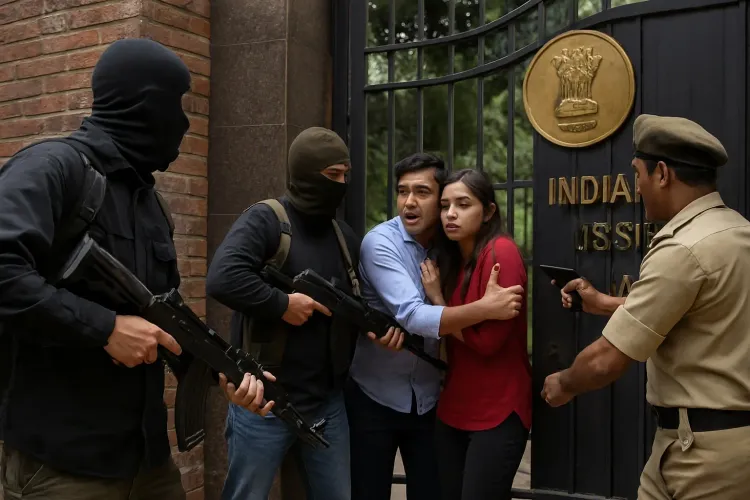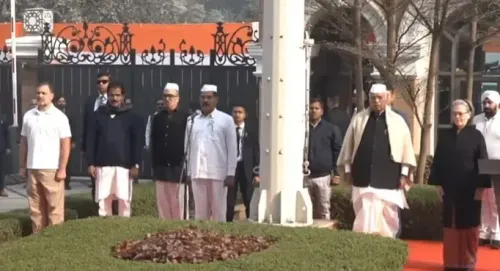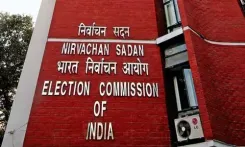Is Sheikh Hasina Being Extradited? Terrorists Plan Hostage Siege at India's Mission in Dhaka

Synopsis
Key Takeaways
- Al Qaeda and Jamaatul Ansar fil Hindal Sharqia are plotting an attack.
- Sheikh Hasina is currently in India after her government was overthrown.
- The ISI is suspected of facilitating these terror activities.
- The demand for Hasina's extradition is straining India-Bangladesh relations.
- Upcoming elections in Bangladesh could be heavily influenced by this situation.
New Delhi, Sep 2 (NationPress) - An alert from the Intelligence Bureau has disclosed that a significant assault was being orchestrated against the Indian High Commission in Dhaka. According to the intelligence, this conspiracy was the work of Al Qaeda in the Subcontinent and the Jamaatul Ansar fil Hindal Sharqia.
These extremist factions aimed to besiege the Indian High Commission and take the diplomats captive, demanding the extradition of Sheikh Hasina from India. Since her government was overthrown, Sheikh Hasina has sought refuge in India.
This matter has strained relations between the two nations, with Bangladesh insisting on her return and blaming this situation for the deteriorating ties.
Security experts suggest that these two terror organizations could not have independently devised such a plan. There is a clear connection to the ISI. During Sheikh Hasina's administration, the ISI was kept at bay, which created tension with the Jamaat-e-Islami, a known proxy for the ISI and staunch opponent of India.
Under Sheikh Hasina, the relationship with India was solid, which has now become a source of frustration for both the ISI and the Jamaat. With the change in government, the ISI has gained considerable influence in Bangladesh.
While Sheikh Hasina did not prioritize relations with Pakistan, some factions in Bangladesh cooperated with the ISI. Since 2023, the ISI, along with its allies, has reportedly smuggled arms into Bangladesh, indicating a broader scheme to destabilize the government and undermine India's interests.
The ISI has long sought to dismantle Sheikh Hasina's administration. An attempt in 2014, marked by the Burdwan bust in West Bengal, highlighted this. Numerous clandestine operations were underway to manufacture explosives intended for transport to Bangladesh, aiming to orchestrate multiple blasts and demand Sheikh Hasina's resignation.
Planning an attack on the Indian mission in Dhaka aligns perfectly with the ISI's objectives. Many of these terror groups remained inactive during Sheikh Hasina's tenure. Such an attack would not only satisfy these factions but also enhance their funding and recruitment efforts.
Since the change in regime, the ISI has intensified its activities in Bangladesh, establishing training camps and sending Jaish-e-Muhammad operatives to educate local terrorists.
Officials in India assert that any actions by the ISI are invariably linked to India. The main agenda is to inflict harm on India, and escalating the presence of terror groups in Bangladesh keeps the northeastern border perpetually unstable, akin to the conditions along the Line of Control (LoC).
The Jamaat echoes the ISI's sentiments, and the push to extradite Sheikh Hasina is a significant political maneuver in Bangladesh. Thus, the strategy to besiege the Indian High Commission and demand her extradition was readily accepted by the Jamaat.
With elections slated for February next year, Sheikh Hasina is poised to be a pivotal issue. The Awami League, led by Hasina, has been barred from participating, indicating a potentially one-sided electoral process.
Although the BNP appears to be leading the electoral race, it is evident that the Jamaat will retain significant influence. At the ISI's urging, the Jamaat is determined to ensure Hasina's return to Bangladesh and prosecution. This serves both as an electoral strategy and a means of vengeance for both the Jamaat and the ISI.
Ultimately, both factions struggled to assert themselves under Hasina's rule in Bangladesh.










